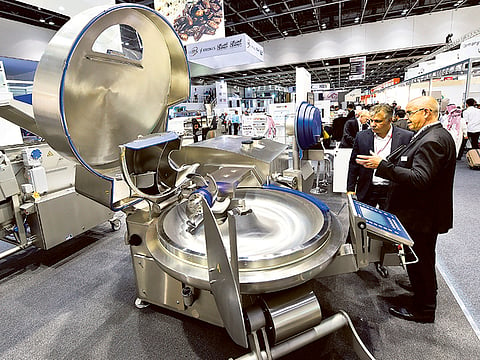Processed meat industry shrugs off concern over processed meat
Demand will not drop, companies say

Dubai: Companies involved in the processed meat industry are adamant that demand will not drop despite a recent report from the World Health Organisation (WHO) that says processed meats are linked to cancer.
Tim Ansell, sales director at Dubai’s Al Thika Packaging, which supplies machines that package processed meat, does not expect consumers to stop buying processed meat.
“I don’t think people are going to change the things they eat based on one report. Maybe we have to eat leaner meat and be careful that it’s not overprocessed, but actually stop eating processed meat? I doubt it,” he said at Gulfood Manufacturing 2015 in Dubai, which kicked off on Tuesday.
Meanwhile, Luuc Van Lankveld, a processing expert at Germany-based GEA, which supplies meat processing machines, said he does not expect sales to drop due to the findings in the report.
“I don’t expect a drop in sales because I believe that the industry will respond to this and come up with healthier ways of producing [processed meat] using different ingredients and processing methods,” he said.
Nick Pearson, global product manager at US-based Provisur Technologies, which sells machines for processing different kinds of food but mainly meat, said that there “will be some impact” on its sales. However, he doesn’t expect it to be significant “because of the growth of other non-meat products, like meat substitutes [which are mainly plant-based]”.
The food industry saw something similar happen a few years ago. The horsemeat scandal in 2013 hurt sales of frozen food in some supermarkets. Bobby Kane, sales manager at Scotland-based Heat and Control, which supplies meat processing machines, said that the horsemeat crisis did not affect its business.
Ansell said that the companies involved in the meat processing industry should work more on ensuring that a meat product can be traced back to its origin.
“That is something that everyone in our industry can do more about. It’s what we call ‘from farm to fork’, where the identity of every cow and chicken that has been processed in a meat factory can be tracked,” he said.
The report from WHO’s International Agency for Research on Cancer (IARC), published on Monday, suggested that processed meats, such as ham and sausages, are carcinogenic to humans, based on evidence that its causes colorectal cancer. It stated that each 50 grams of processed meat consumed daily increases the risk of colorectal cancer by 18 per cent.
“For an individual, the risk of developing colorectal cancer because of their consumption of processed meat remains small, but this risk increases with the amount of meat consumed,” Dr Kurt Straif, head of the IARC Monographs Programme, said in a statement.
Processed meats are modified to enhance their taste or preserve them for an extended time through a number of methods including salting, curing, fermentation and smoking.
The WHO, meanwhile, said that red meats, such as beef, pork and lamb, are “probably carcinogenic to humans” based on limited evidence.
The IARC working group of 22 experts from 10 countries looked at 800 studies that investigated associations of more than a dozen types of cancer with the consumption of red meat or processed meat in many countries with diverse diets.



